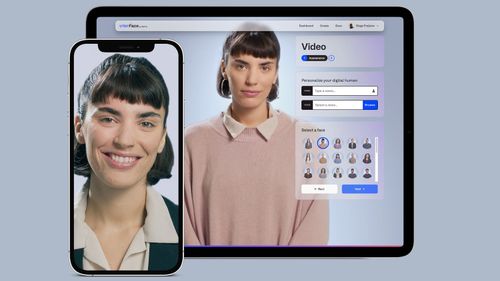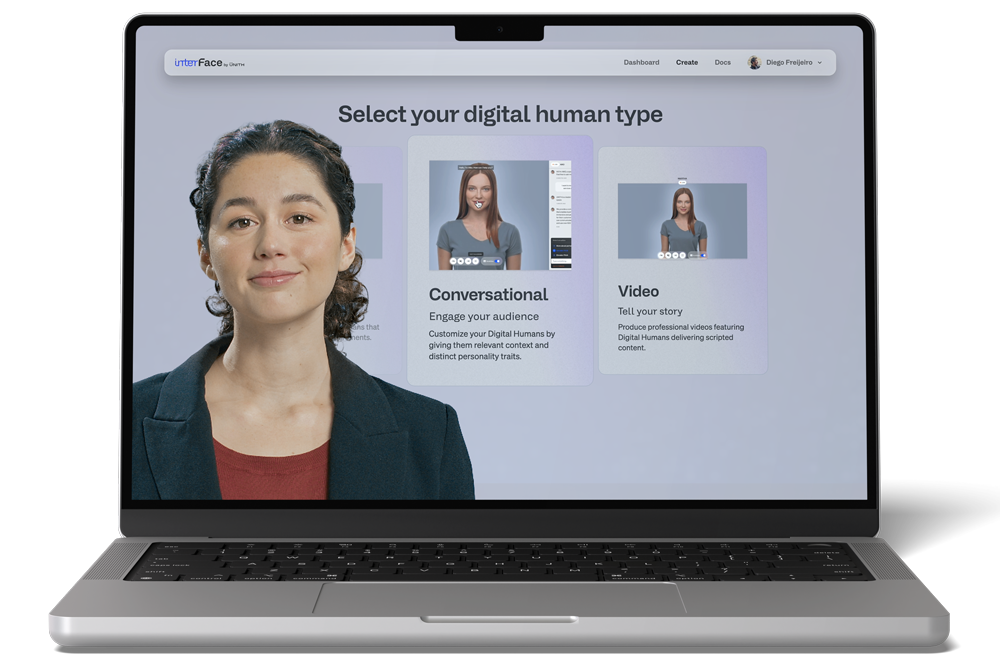How creating bespoke AI-equipped digital humans is transforming business operations
By Rakan Sleiman, UNITH vice president of product >>
SMALL-to-medium sized businesses (SMBs) have traditionally faced a challenge: how do you scale the essential support services that rely on good human to human contact, such as customer support, HR and onboarding, as your business grows?
Customisable digital human artificial intelligence (AI) tools can now help SMBs streamline administrative work across several crucial areas in their businesses, while personalising internal and external company interactions. 
This leads to strengthened customer support services, improved staff training, better onboarding of new employees, and enhanced sales and marketing efforts.
Sales reps look to spend more time with their clients and potential customers, but many of them spend their time on administrative tasks. During the week, sales reps spend about 28 percent of their time selling with the rest spent on manual tasks[1].
There are also poor onboarding practices that tend to lead to higher turnover, with 69 percent of employees reporting they are more likely to stay with an organisation for three years if they experience great onboarding[2].
That gap still exists, because most employees aren’t happy with current onboarding, as only 12 percent of employees strongly agree that their company ‘does a great job’ onboarding[3].
Many organisations see the importance of personalised learning for employees, with high-growth companies twice as likely, compared with other businesses, to offer tailored training. There is room to grow for customised training, as only 17 percent of companies say they have effective training[4].
When wanting answers to queries, customers expect an immediate response from a business. Some 90 percent of customers are expecting a response in 10 minutes or less when they have a customer service question[5].
Effectively solving these issues is crucial for organisations, with 90 percent of customers regarding resolution as the most important customer service issue[6].
A digital human platform can help resolve problems
UNITH’s self-service digital human platform, interFace, can help organisations solve these business challenges.
Through interFace, users can create their own digital humans by using specialist avatars and voices in 60 different languages. There is a free version for anyone to use, but this is only suitable for individual purposes.
For SMBs, it is ideal to unlock interFace’s more bespoke features to create a digital human that reflects the company’s values.
This is done via premium subscriptions and enterprise packages. 
These enhanced digital humans provide SMBs with additional conversational sessions and text-to-videos, more digital humans and branding customisation, and face and voice cloning; or even application programming interface (API) access to provide an even deeper level of customisation and integration.
Some of the key business challenges that interFace can solve include learning and development of staff, customer support, sales and marketing, human resources, and hospitality services.
Learning and development
Fostering a connection is important in the learning and development for employees as they grow with the company. Therefore, it is important that digital humans appear to be as human as possible.
InterFace uses large language models (LLMs) to create more life-like digital humans, compared with traditional chatbots. By using LLMs to respond quicker and more naturally to the user, particularly through interFace’s appearance, voice, and interaction, it creates a better connection.
Employees also always have access to their digital humans, which ensures continuous development without relying on other resources within the company. This better access can help accelerate learning through real-time feedback and role-playing exercises that identify strengths and areas for improvement.
Customer support
Customers that have access to digital humans are not limited by time and location, and are available anytime, anywhere, on any device. InterFace can provide access to real-time information to customers anywhere in the world, given that the digital humans are kept up to date with the latest information.
The best customer support offered by interFace digital humans will be those that are personalised, ensuring that your brand’s value is effectively conveyed, along with using real life scenarios to help address the customer’s needs.
Sales and marketing
InterFace can assist sales and marketing teams in finalising sales and saving time. This means that sales reps can focus on more important tasks and improving sales. InterFace can personalise the sales process for customers and make it more relevant by creating a bespoke approach for both the customer and sales and marketing team.
The digital human AI of interFace can automate and streamline tasks and act as a part of the team by answering queries, spur sales leads by recommending products to customers, and suggest other items. Sales and marketing teams can also create personalised interFace digital humans. This can help teams keep up with the latest products and trends.
Human resources
One crucial element for human resource departments is onboarding. In many cases, the onboarding experience for new employees can determine job satisfaction and if they would leave the company sooner than planned.
InterFace can help human resources departments get onboarding right by providing a more engaging experience for new employees, as this novel digital approach can get their attention.
The interFace digital humans also provide information to new employees, so human resource departments spend less time dealing with multiple queries. Therefore, interFace helps streamline their work, so they can save time and focus on other important tasks and even create new ways through digital humans to further improve the onboarding experience.
Hospitality
Digital humans can also act as assistance concierges for hotels in a range of administration activities. By focussing less on these tasks, hotel staff can make sure visitors are getting the best service and enjoy their vacation.
Visitors can also engage with digital humans to not only book their stay but also gather feedback after they check out. This data can then be used by hotels to create personalised digital humans that make recommendations for guests’ stay.
ABOUT THE AUTHOR 
Rakan Sleiman is the vice president of product at UNITH, an Australian-European-based artificial intelligence business. UNITH focuses on media technology used to develop conversational commerce. UNITH’s Digital Human platform combines AI with machine learning based technology to generate digital avatars that appear visually as unique individuals.
REFERENCES
[1] https://www.salesforce.com/au/blog/sales-support/
[3] https://www.gallup.com/workplace/235121/why-onboarding-experience-key-retention.aspx
[4] https://qwilr.com/blog/sales-training-statistics/
[5] https://blog.hubspot.com/sales/live-chat-go-to-market-flaw?
[6] https://assets.kpmg.com/content/dam/kpmg/be/pdf/2020/08/customer-experience-in-the-new-reality.pdf
Ends

 How to resolve AdBlock issue?
How to resolve AdBlock issue?